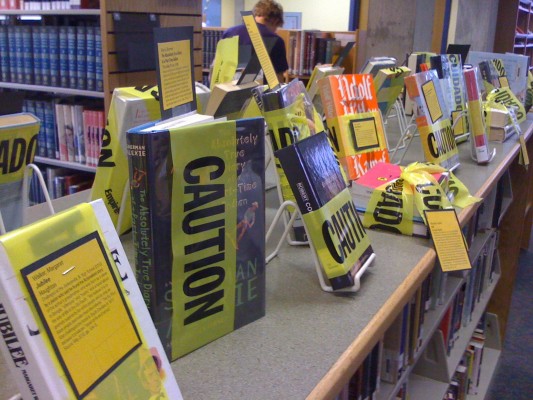Please Don’t Ban Required Reading Books
September 8, 2015
The censorship of required reading in schools is often a contentious subject in the United States. It often exacerbates issues of freedom of speech and religion, while revealing the social and political values of the affected communities. Recently, two events regarding the possible censorship of required readings have been publicized. At Duke University, a group of incoming freshmen have refused to read the novel “Fun Home,” which has become a Tony Award-winning play; and parents in Duval County, Fla., have started a Facebook campaign to remove two books about the Middle East from the third grade curriculum. In both cases, the individuals trying to ban the books identify as Christians, and feel that the books challenge their beliefs. However, trying to ban required reading on that basis is unfounded, because required reading shouldn’t be viewed as persuasive or institutionalizing. Rather, potential readers should be more open to the opportunities for cultural growth that these stories provide.
Jack Corrigan of WGNtv.com described “Fun Home” as the story of artist and author Alison Bechdel “coming to terms with her homosexuality and discovering that her father, who commits suicide, was gay.” Though homosexuality and suicide are oftentimes taboo topics in certain religious environments, “Fun Home” contains themes that go beyond these topics that make it into a viable required-reading story. For college students, the intended audience, the fact that the main character is a young adult that goes through changes in her sense of self and endures emotional turmoil is very important. Duke’s faculty assigned the book to incoming freshman, many of whom experience anxiety and degrees of self-discovery when taking on new environments and situations. The fact that Alison is realizing her true sexual nature certainly qualifies as a new emotional challenge, so she becomes a very relatable character. If the students who refused to read the book had simply looked beyond the surface of the storyline and its controversy, they would have been able to gain insight into their own emotions by sympathizing with Alison’s experience.
The two books with stories based in the Middle East are “Nasreen’s Secret School” and “The Librarian of Basra.” The first is about a young girl whose grandmother, at personal risk, enrolls the child in a secret school for girls in Afghanistan. The second is about Alia Muhammad Baker, a librarian from Iraq who tries to preserve her town’s book collection despite the region’s war. Both books are based on true events, which is notable considering one of the reasons that Duval County residents want to ban the books: to protect children of military families against Anti-American war sentiments. However, since these are books designed for children, it’s unlikely that they contain heavy-handed political statements or depictions of harsh violence. And if they did, it’s unlikely that the children reading them would pick up on their subtleties. Instead, they offer American children a glimpse into the lives of their contemporaries in the Middle East. Neither gender is prevented an education in the United States in the ways that girls are in Afghanistan. “Nasreen’s Secret School” shows American children that there are individuals their age in the world who have to fight for the opportunity to better themselves and expand their minds. In this way, children in the United States are taught to value their educations and to realize their freedoms, which are the same freedoms and values that our military fights for. There is also a level of universality in Alia Muhammad Baker’s story, in that the attempt to save the books is an attempt to save imagination and cultural awareness. Both books provide children with exposure to different cultures, and invite them to appreciate knowledge and the ability to learn. So although the characters in these books practice the Islamic faith, these books are not meant as conversion tools, and should not be banned from Florida elementary schools.
Since required reading is by nature material that its current audience might not have read on its own, the literature should be seen as an opportunity for students to expand their modes of thinking beyond their current views. Through a disruption of the reader’s personal morals, these readings combat ignorance on international culture. This is especially true when the characters in required readings come from very different situations than the people trying to ban them. Only through differences can one develop into a more intelligent individual, because differences allow for mental adaptation and the reversal of stagnant circumstances. Controversial required readings should remain required so that students who are developing their own views of the world, outside of the status quo of their parents, can shape their views with varied information. Hopefully, this will lead to increased levels of tolerance and understanding for foreign individuals and their communities, especially when polarized societies, both East and West, interact.










